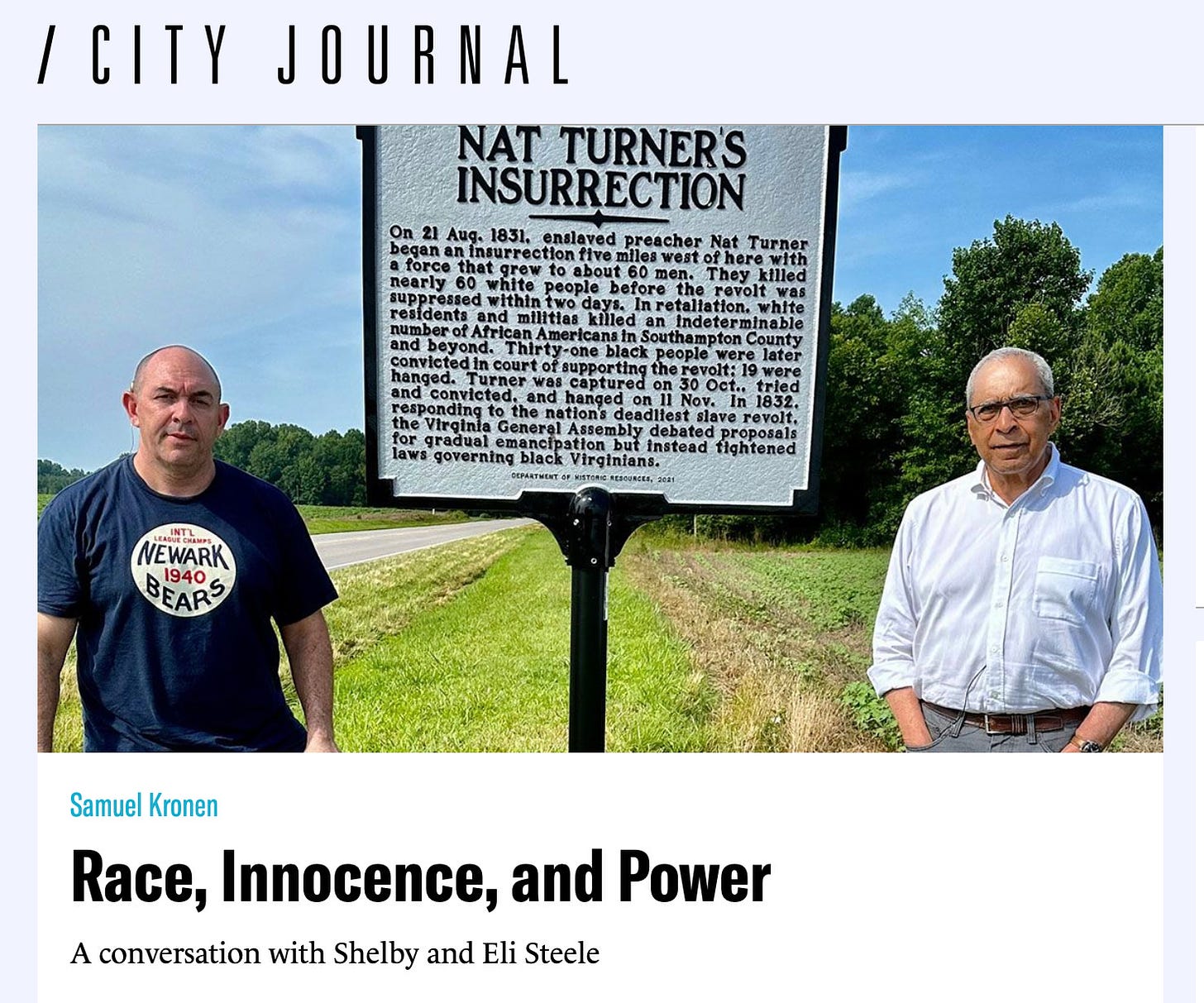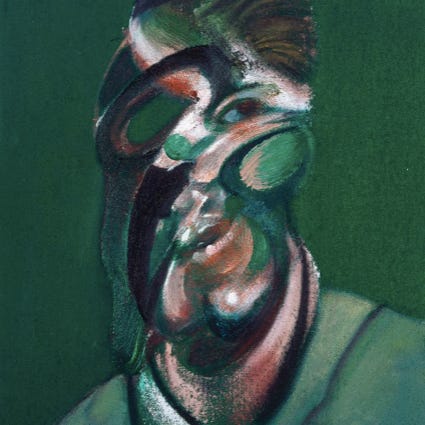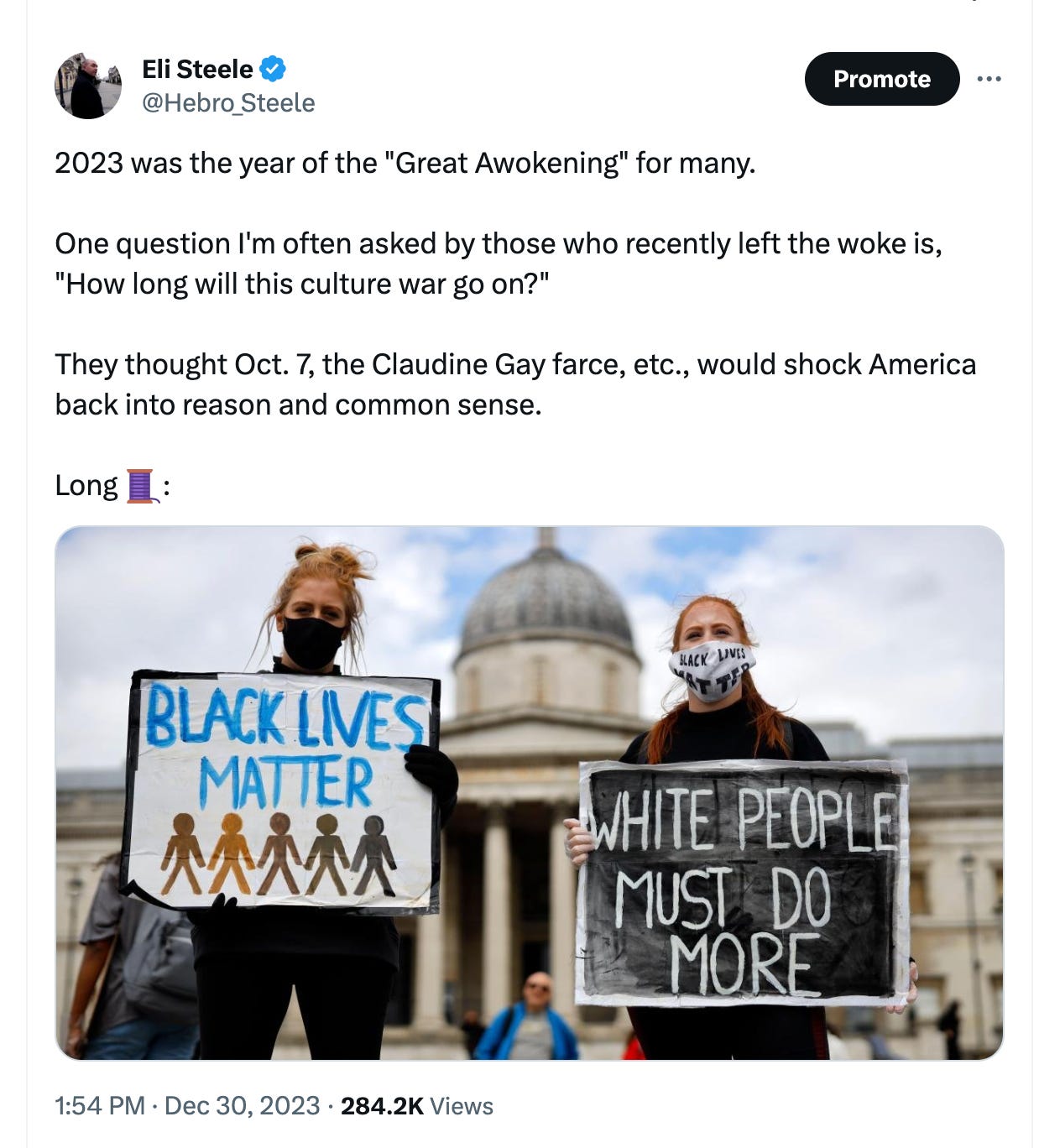Hi all,
2023 was quite the year for many of us — a turbulent mixture of positives and negatives. So it was nice to end this year with quiet and quality time with the family in Arizona, which included a trip to the beautiful Sedona Mountains with the four family dogs.
Before the official end of 2023, I wanted to reach out to you for two reasons.
First, a deep thank you all for your support throughout this past year. Everything from the donations to our film, Substack subscriptions to the kind words has meant much to us. Some of you have spread word about us to others and we truly appreciate that. So, thank you for your support and friendship.
The second reason is that I just received an email from Samuel Kronen that his Q&A article on my father and I was just published in the City Journal today as their end-of-the-year piece. Kronen is a gifted writer and interviewer and here is the opening part:
Samuel Kronen: Shelby, you write about race in a very human, and humanizing, way. You say, “The mistake we make when we look at race is simply to look at race.” I wonder if either of you considers yourself a “humanist,” and if the word means anything in particular to you?
Shelby Steele: Well, it’s more of an anti-ideological description. When someone’s a humanist they are neither left nor right, so it’s a good move. So yes, I probably would at least loosely come under that category.
Eli Steele: I usually use the word individualist. We’re not primarily interested in groups, racial categories, and all of that. My father and I are trying to put the individual first, the human being first. It’s not that we’re anti-group, we see the value of that. But the emphasis, especially in America, always has to be on the human, on the individual.
Kronen: Shelby, you tend to use the lens of individual psychology when analyzing social issues. I’m curious what made you gravitate toward that way of thinking—I know you have several psychologists in your family.
Shelby Steele: It seemed to me there was nowhere else to go. You can use the economic approach up to a certain point, you can talk about levels of education, and all sorts of things. But my feeling is that all stories are human stories. And human psychology is always in play, powerfully so. The word “psychology” almost narrows it down too much, but everything is, in that sense, psychological, human. You could psychologically analyze the reason we are sitting here now. And it seemed to me that I could get closer to reality by looking in this human direction to understand why people are doing what they’re doing. If you don’t go there, you miss the story. You miss reality. That’s a weakness, I think, in our contemporary discussion. We call this way of thinking “psychobabble,” and we’re dismissive about it. But I think it’s extremely important.
Eli Steele: I would also add that when ideology comes in, there’s no psychology. When you become a follower of an ideology, you lose yourself and become obedient to the group. As outsiders, we use psychology to look at why that may be, and also why it’s important not to do that.
Kronen: Psychology, in this sense, is anti-ideology. A psychological concept you write about, Shelby, is innocence. It struck me when I first read about this theme in The Content of Our Character, because I never thought about innocence in that way—how innocence relates to guilt, and how they both relate to morality and power. I was wondering where that theme came from—you mention Kierkegaard—and what intrigued you about it?
Shelby Steele: It appeared to me to be a huge part of the story of race in America and in the world. It’s a deeply moral issue, involving man’s inhumanity to man. You can’t get to the truth of that story any other way. That’s where I think psychology fills out the picture more—not completely, but a good deal more. I love Albert Camus. I’m writing about him at the moment. It’s the same sort of humanistic look at things. The motivations human beings follow are complex, and involve not just economics and history, but also the impulses that humans have in certain circumstances that fascinate me and are a little scary.
Eli Steele: It’s a great question. If you’re talking about innocence in 1990, that book [The Content of Our Character], it made me think about how what’s going on today is an almost perverted battle for innocence. How powerful it is to certain people to believe in the ideology that gets them that innocence. They’re doing irrational things like lowering standards for black students that they would never do for their own family. Why are they doing that? Because it’s a way to be innocent of the past.
Shelby Steele: Innocence is power. In a society like America, with our history, we have this combination of unparalleled greatness and almost unbelievable evil. The pressures of being an American involve grappling with innocence. We have wealth; now we want innocence—that’s where power lies at the moment. So much of our politics and culture really come out of this struggle with innocence. Wokeness is nothing more or less than this struggle for innocence—a way to be innocent, and therefore to have power. This leads to dark things. We have wealth, but we don’t have the legitimacy innocence gives us. It’s politics—“my politics have more innocence than yours.” The Left has an appeal and power on this terrain that the Right does not. The Right is hampered by the fact that they simply have no access to innocence. They’re almost dumbfounded by how powerful the Left is.
To read the rest of the interview and more of my father’s insights, please click here.
Also, Kronen has written two excellent articles on my father that are worth checking out: “American Humanist” and “The Prescience of Shelby Steele.” Still a young man, Kronen is a writer on the rise and his work, especially his meditations on living with a debilitating disease, is on the level of literature and worthy of following. Here is the link to his substack page:
Lastly, I did a X (twitter) thread yesterday on my thoughts regarding what lies ahead of us in 2024 and here is the link:
My father and I wish you nothing but all the best for 2024!
My best,
Eli







Reading this enlightened and enlightening interview with your father and you, I realize that I need to read Dr. Steele’s books, not simply his comments. His insights (and yours, following in his thought-steps) are the most inspiring that I’ve encountered in the ongoing discussion about race in America. As a Jew raised by very left-wing parents who were born in the 1920s, I was instilled with an awareness of racism and anti-semitism beginning with the “N-word lecture” that my mother gave me at the kitchen table when I was four years old. I learned that racism is a great evil that has the potential to destroy the world. Your father’s prescription for its eradication is the only one that resonates with me: personal responsibility and agency, letting go of blame and victimhood, abandoning the superficial stereotypes of identity politics, and focusing on forgiveness, love, and ultimately, Humanism.
Happy New Year to you and yours, Eli. Wishing you much success with the new film in 2024.
Thanks for a great post today. Happy New Year!
As someone on the Right, let me say that I don't care about innocence. I don't need the absolution of the Left, and them to tell me I'm a good person. Sorry for the profanity, but fuck that, and fuck them. They're arsonists and terrorists and want to destroy everything I've loved in my life, including my own family and family history. If I'm a bellwether of where many people are now, let it be so. Many of us are sick of it to the point that you can't call us names or cancel us. I'm unfireable at the job I hold, which is in rural America, but still, I'd rather starve to death than bend the knee before these people. I'd rather be fired than mouth the words. Fuck that. They don't deserve the sweat off of my crotch, and they will get nothing from me. There are many others like me, who are ready to go the mat. We're done with it all.
Happy New Year and best wishes to you and your father and family.